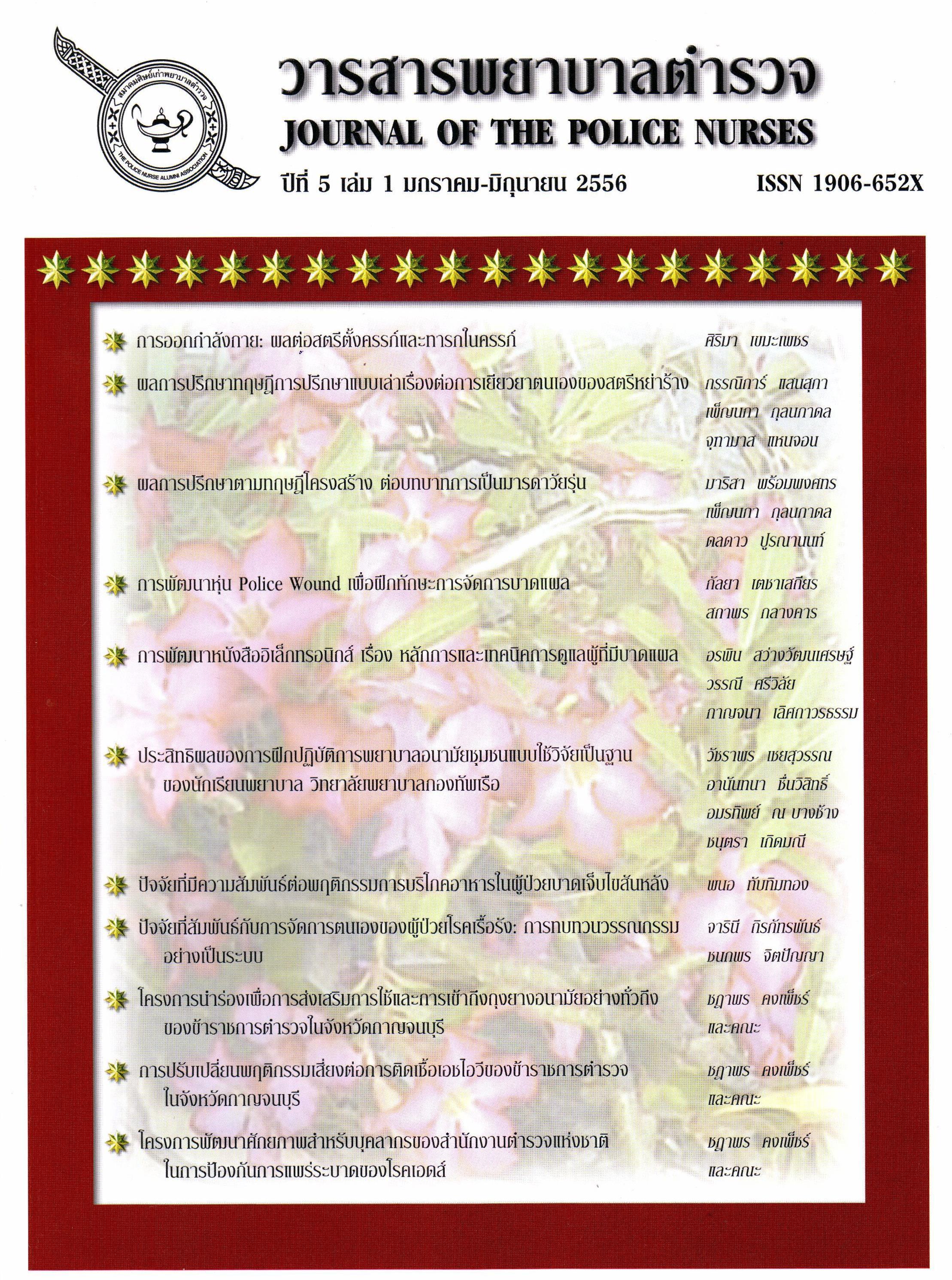ปัจจัยที่มีความสัมพันธ์ต่อพฤติกรรมการบริโภคอาหารในผู้ป่วยบาดเจ็บไขสันหลัง
Keywords:
พฤติกรรมการบริโภคอาหาร, ผู้ป่วยบาดเจ็บไขสันหลัง, eating behavior, spinal injury patientsAbstract
บทคัดย่อ
การวิจัยครั้งนี้เป็นการวิจัยแบบบรรยายเชิงความสัมพันธ์ โดยมีวัตถุประสงค์เพื่อศึกษาพฤติกรรมการบริโภคอาหารและปัจจัยที่มีความสัมพันธ์กับพฤติกรรมการบริโภคอาหารในผู้ป่วยบาดเจ็บไขสันหลัง โดยใช้กรอบแนวคิดของรอยในกลุ่มตัวอย่างอายุ 18- 60 ปี ในผู้ป่วยบาดเจ็บไขสันหลังภายหลังที่ได้รับการจำหน่ายออกจากโรงพยาบาลจำนวน 80 คนที่มารับบริการแผนกผู้ป่วยนอก ระบบศัลยกรรมประสาท ระบบศัลยกรรมกระดูกและข้อ แผนกเวชศาสตร์ฟื้นฟู โรงพยาบาลจุฬาลงกรณ์ และโรงพยาบาลพระมงกุฎเกล้า เครื่องมือที่ใช้ในการวิจัยประกอบด้วย แบบสอบถามข้อมูลส่วนบุคคล แบบสอบถามภาวะซึมเศร้า แบบสอบถามสัมพันธภาพในครอบครัว แบบสอบถามการพึ่งพาตนเอง และแบบสอบถามพฤติกรรมการบริโภคอาหาร ค่าความเที่ยงสัมประสิทธิ์แอลฟาครอนบาค เท่ากับ 0.92, 0.89, 0.94, และ 0.80 วิเคราะห์ข้อมูลด้วยการแจกแจงความถี่ ร้อยละ ค่าเฉลี่ย ส่วนเบี่ยงเบนมาตรฐาน สถิติไคแสควร์ ค่าสัมประสิทธิ์การจรณ์ และสัมประสิทธิ์สหสัมพันธ์เพียร์สัน
ผลการวิจัยสรุปได้ว่า
1. กลุ่มตัวอย่างผู้ป่วยบาดเจ็บไขสันหลังมีพฤติกรรมการบริโภคอาหารโดยรวมอยู่ในระดับดี ( =3.84, SD=.34)
2. ระดับการบาดเจ็บ ภาวะความซึมเศร้า ไม่มีความสัมพันธ์กับพฤติกรรมการบริโภคอาหารในผู้ป่วยบาดเจ็บไขสันหลัง
3. การพึ่งพาตนเองมีความสัมพันธ์กับพฤติกรรมการบริโภคอาหารในผู้ป่วยบาดเจ็บไขสันหลังอย่างมีนัยสำคัญทางสถิติที่ระดับ P= 0.05 (c2 = 91.22; P=.003)
4. สัมพันธภาพในครอบครัวมีความสัมพันธ์ทางบวกกับพฤติกรรมการบริโภคอาหารในผู้ป่วยบาดเจ็บไขสันหลังอย่างมีนัยสำคัญทางสถิติ p = 0.05 (r = .239)
คำสำคัญ: พฤติกรรมการบริโภคอาหาร; ผู้ป่วยบาดเจ็บไขสันหลัง
FACTORS RELATED TO EATING BEHAVIOR IN SPINAL INJURY PATIENTS
Abstract
This study was a correlation study. The objectives of this research were to study the eating behavior and the factors related to eating behavior in spinal injury patients according to Roy’s framework. The study enrolled 80 patients who had been diagnosed as spinal injury and after discharge at neurosurgery, orthopedic surgery, rehabilitation medicine outpatient department of King Chulalongkorn Memorial Hospital and Phramongkutklao Hospital. The instuments for data collection included a demographic data form, assessment form of clinical swallowing, and data were collected by self adminited questionnaires including patients’ depression, family relationship, patients’ self-dependence, and the eating behavior. Questionnaires were tested for reliability and Cronbach’s alpha coefficient was 0.92, 0.89, 0.94, and 0.80, respectively. The data were analyzed by frequency, percentage, mean, standard deviation, Chi-Square, Contingency-coefficient and Pearson’s product moment.
The major finding was as follow:
1. The spinal injury patients had a good eating behavior scores ( =3.84, SD=.34).
2. The level of injury and patient’s depression level was not related to eating behavior scores in spinal injury patients.
3. Patient’s self-dependence level had significant correlation with eating behavior scores in the spinal injury patients. (c2= 91.22; P-value.003).
4. Family relationship scores had significant positive correlation with eating behavior scores in spinal injury patients (r= .239; p=0.05).
Keywords: eating behavior; spinal injury patients
Downloads
Downloads
How to Cite
Issue
Section
License
ผลงานที่ได้ตีพิมพ์แล้วจะเป็นลิขสิทธิ์ของวารสารพยาบาลตำรวจ















